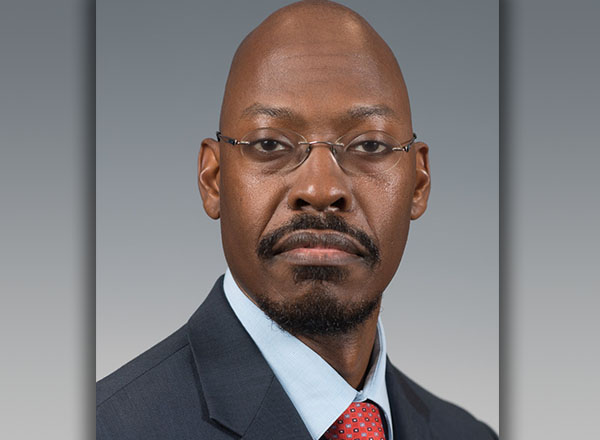HFC names Chardin Claybourne Director of the Henry Ford II Honors Program

After serving as the faculty director of the Learning Lab at HFC for nearly a decade, Chardin Claybourne has been named director of the Henry Ford II Honors Program.
“This role of the director of the Honors Program gives me the opportunity for a new professional experience in higher education after serving in the Learning Lab for nearly 10 years and in similar roles at other colleges. I’ve enjoyed my time in the Learning Lab, but this is a welcome change,” said Claybourne.
Claybourne replaces Dr. Brad Romans as Honors Program director. The Dean of the HFC School of Liberal Arts, Romans served as the interim director of the Honors Program for several months after Dr. Adam Hazlett stepped down from the role. Claybourne now reports to Romans.
“Chardin brings a wealth of expertise and experience to his new role,” said Romans. “During his tenure, the Learning Lab instituted online tutoring support, collaborated with the English Language Institute for ESL-specific programming, reinforced its partnership with the Math department, and was one of the first departments to participate in the HFC Early Alert system. He has published articles on antiracism through The Colleagues of Color for Social Justice and on student success for the League for Innovation in the Community College. I am looking forward to working with him in this new role.”
Opportunities to stretch and challenge
Claybourne is an alumnus of Cass Technical High School in Detroit. A two-alumnus of Central Michigan University, he earned his bachelor’s and master’s degrees in English. He completed graduate coursework at Wayne State University. He is working on his doctorate in educational leadership at Ferris State University.
Claybourne has worked in higher education for more than 20 years. He worked at Oakland University and at Wayne State before coming to HFC in 2015. But higher education was not his original career goal.
“I knew I wanted to teach. After finishing my master’s and serving as a teaching assistant, I wanted to see what else was out there,” he recalled. “My first job offer was a staff role at OU, where I worked in student retention. I really liked it. I realized being in higher ed was a good fit.”
During his time at HFC, Claybourne has chaired and served on various committees, including the Student Support Committee, the Faculty Senate, the Strategic Planning Team, and the Local 1650 Executive Board. He serves as co-faculty advisor to the Black Male and QUEENS Focus Group and as the faculty advisor to the Phi Theta Kappa (PTK) Honor Society.
“I get to work with the best and brightest students at HFC. Some students are members of the Honors Program, BMQFG, and PTK,” he said. “It is very rewarding to work with such high-achieving, high-performing students. It gives me the opportunity to stretch and challenge myself and learn new things. I’m looking forward to building on the good works of my predecessors, and I am ready for the challenge.”
His objectives as director of the Honors Program include:
- Increasing the number of students enrolled.
- Increasing the student diversity to be more representative of HFC’s student body.
- Implementing procedural efficiencies.
- Collaborating with honors programs at other Michigan colleges.
- Serving as a mentor for students.
“My ultimate goal is to expand the Honors Program and make it into the premier honors program at a community college in all of Michigan,” said Claybourne.
Getting involved at all levels
HFC sociology instructor and BMQFG faculty advisor Dr. Kalvin DaRonne Harvell is excited about Claybourne’s new role, calling him a true champion for students. The two have worked together for nearly a decade.
“Mr. Claybourne’s appointment to this position tells the community that HFC desires the best for our students!” said Harvell. “I continue to be amazed by his dedication to student achievement, ethic of care, and thoughtful leadership praxis. His commitment to student success is evident through his deeds. He does not simply lead from his office. In the tradition of Kujichagulia (self-determination), he draws from a complex array of intellectual locations to engage students and enhance their ideological and material conditions. A brilliant strategist, Mr. Claybourne's leadership philosophy, practice, and potential serves as a model for all who strive to enhance the student condition and achieve the desired goals of an organization. If I may speak as a parent, Mr. Claybourne is the type of leader and role model I want my daughter to connect with when she attends college. As a colleague, I count him as one of my heroes.”
Claybourne’s collaborative relationships with HFC faculty, staff, and students, combined with his knowledge of process and HFC culture, will help him get up to speed quickly in his new role.
“The students I work with are fantastic, well-rounded, kind, and intellectual people,” said Claybourne. “It’s a joy to work with them. They keep me young.”
For Claybourne, the best part of working at HFC is how much opportunity he has to get involved at all levels.
“Not many places allow for the level of interaction you have at HFC. It’s not difficult here to have meaningful contact with cabinet-level leaders,” he explained. “The fact that you get to have input into how the College operates through shared governance – something that does not happen everywhere – says a lot about HFC. It’s what makes HFC unique and something I value about our College.”